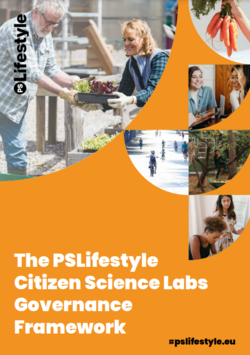Report: The PSLifestyle Citizen Science Labs Governance Framework
Few topics gather as much consent around the globe as the general vision for a good life and sustainable future, among key actors, such as policy, industry, civil society organisations (CSOs), researchers, and citizens. Out of the 197 governing parties to the Convention of the Paris agreement, 193 have signed and ratified the terms [1]. Ever more businesses are taking proactive steps to lower their negative impacts, while practitioners including CSOs, researchers and universities are continuously generating up to date information and insights on what it means to live well and within planetary boundaries as well as work towards advancing the sustainable development agenda. Likewise, citizens around the world discover their taste for more socially fair and environmentally conscious consumption and lifestyle patterns. This appetite goes along with the growing understanding that living within the planetary boundaries does not necessarily need to translate into losing out on one’s standard of living. Instead, it creates the opportunity to win and realise synergies between the personal as well as the planetary well-being.
However, citizens / consumers as well as key actors all too often hit their roadblocks when trying to explore these synergies. There are still significant challenges to breaking down the motivating yet potentially abstract vision of a life in harmony with nature. In that way, ambitious targets and/or products / services brought forward by key actors mean well but do not always reflect the realities of some social groups. Thus, some of the goodwill and energy of people and these actors run rather in parallel than in congruence. But for some time now, systemic actors and citizens have a new tool available in their kit which fosters co-creation, ownership and reliable results – it is called citizen science.
While various definitions for citizen science exist, they commonly stress that “[at] its most inclusive and most innovative, citizen science involves citizen volunteers as partners in the entire scientific process, including determining research themes, questions, methodologies, and means of disseminating results” [2, pg.15-18]. The prominent focus here is the holistic engagement and participation of citizens.
One method that is serving exactly that purpose and takes citizen science at face value is the Living Labs methodology. Living Labs define innovation fundamentally through the participation of stakeholders like citizens, so that products and services reflect and serve their needs and as such translate to more economically and socially sustainable solutions. Therewith, citizens play a key role in the design and innovation process.
The unique insights shared through this approach about the participants’ lifestyles, interaction with spaces or process and consumption habits offer not only rich data to jointly design effective solutions of varying nature (e.g., policies, products, services and other) but at the same time often form an experience of ownership and self-efficacy. This participatory dialogue process in turn has the potential to encourage long-lasting sustainable behaviours. In this manner, science serves the needs of society and empowers its citizens and systemic actors.
Publication Date: 30 Jun 2022
This project has received funding from the European Union’s Horizon 2020 research and innovation programme under grant agreement No 101037342.
